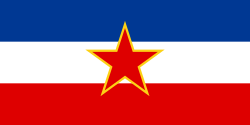Top Qs
Timeline
Chat
Perspective
Yugoslavia at the Olympics
Sporting event delegation From Wikipedia, the free encyclopedia
Remove ads
Teams from Yugoslavia first participated at the Olympic Games in 1920. Previously, several athletes from Croatia, Slovenia and northern Serbian province Vojvodina had competed for Austria or Hungary when those countries were part of the Empire of Austria-Hungary. A small team of two athletes had competed distinctly for Serbia at the 1912 Summer Olympics.
Yugoslavia has been the designation for Olympic teams from three distinct national entities:
- Kingdom of Yugoslavia (officially called the Kingdom of Serbs, Croats and Slovenes until 1929) from 1920 to 1936
- Socialist Federal Republic of Yugoslavia from 1948 to the 1992 Winter Olympics
- Federal Republic of Yugoslavia, formed as a joint state by only Montenegro and Serbia after the breakup of Yugoslavia, from 1992 to 2002 (due to UN ban allowed to compete as Independent Olympic Participants at the 1992 Summer Olympics and was not allowed to compete at 1994 Winter Olympics)
Two of the successor nations (Croatia and Slovenia) began to compete as independent teams at the Olympics starting at the 1992 Winter Games and Bosnia and Herzegovina at the 1992 Summer Games and as of the 2008 Summer Olympics, all six successor nations, former socialist republics, have participated independently. Kosovo, a former autonomous province, made its Olympic debut as an independent national team at the 2016 Summer Olympics.
Remove ads
Timeline of participation
Summarize
Perspective
The Yugoslav Olympic Committee was established in Zagreb in 1919 (recognized by the IOC in 1920), before moving to Belgrade in 1927, and it took the place of the Serbian Olympic Committee in the Association of National Olympic Committees. During the dissolution of Yugoslavia, several new committees were formed in the break-away countries. The Federal Republic of Yugoslavia, consisting of the Republic of Serbia and the Republic of Montenegro, participated at the Games since 1996. At the 1996[1] and 2000[2] Games, the nation was designated with the same code, Yugoslavia (YUG), as the defunct SFRY. It was rechartered as the State Union of Serbia and Montenegro in 2003 with there being no territorial changes. The Serbia and Montenegro (SCG) designation and code were used at the 2004 Games.[3]
Remove ads
Hosted Games
Yugoslavia has hosted the Games on one occasion.
Medal tables
Summarize
Perspective
Host country
- Yugoslavia hosted the 1984 Winter Olympics in Sarajevo, now part of Bosnia and Herzegovina.
Medals by Summer Games
Medals by Winter Games
Medals by summer sport
- As Independent Olympic Participants
Medals by winter sport
List of medalists
Summer Olympics
- As Federal Republic of Yugoslavia
- As Independent Olympic Participants
Winter Olympics
Remove ads
Medal table after Yugoslavia
Summarize
Perspective
Teams from Yugoslavia first participated at the Olympic Games in 1920. Yugoslavia has been the designation for Olympic teams from three distinct national entities:
- Kingdom of Yugoslavia (officially called the Kingdom of Serbs, Croats and Slovenes until 1929) from 1920 to 1936
- Socialist Federal Republic of Yugoslavia from 1948 to the 1992 Winter Olympics
- Federal Republic of Yugoslavia, formed as a joint state by only Montenegro and Serbia after the breakup of Yugoslavia, from 1996 to 2002
The United Nations[4] affirmed that the Socialist Federal Republic of Yugoslavia had ceased to exist, and the Federal Republic of Yugoslavia (FRY) was a new state. All former republics were entitled to state succession, while none of them continued SFR Yugoslavia's international legal personality. As a result of the U.N. resolution, individual FRY athletes were allowed to compete as Independent Olympic Participants at the 1992 Summer Olympics, and FRY was not allowed to compete at the 1994 Winter Olympics.
The Federal Republic of Yugoslavia, consisting of the Republic of Serbia and the Republic of Montenegro, participated at the Games since 1996. At the 1996[1] Games, the nation was designated with the same code, Yugoslavia (YUG), as the defunct SFRY. It was rechartered as the State Union of Serbia and Montenegro in 2003 with there being no territorial changes. The Serbia and Montenegro (SCG) designation and code were used at the 2004 Games.[3]
Two of the successor nations (Croatia and Slovenia) began to compete as independent teams at the Olympics starting at the 1992 Winter Games and Bosnia and Herzegovina at the 1992 Summer Games and as of the 2008 Summer Olympics, all six successor nations, former socialist republics, have participated independently. Kosovo, a former autonomous province, made its Olympic debut as an independent national team at the 2016 Summer Olympics.
Medal counts:
status after the 2024 Summer Olympics
Remove ads
See also
References
External links
Wikiwand - on
Seamless Wikipedia browsing. On steroids.
Remove ads

